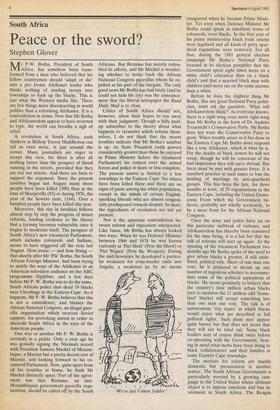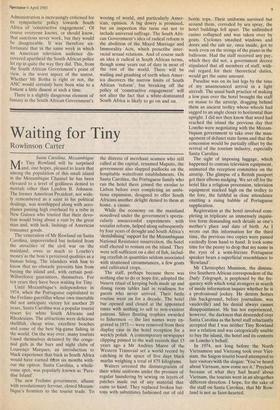South Africa
Peace or the sword?
Stephen Glover
Mr P.W. Botha, President of South Africa, has somehow been trans- formed from a man who believed that his
fellow countrymen should 'adapt or die' into a pro forma Afrikaner leader who thinks nothing of sending troops into townships to bash up the blacks. This is just what the Western media like. There are few things more disconcerting in world politics than a reforming Afrikaner. It is a contradiction in terms. Now that Mr Botha and Afrikanerdom appear to have reverted to type, the world can breathe a sigh of relief.
A revolution in South Africa, such thinkers as Bishop Trevor Huddleston can tell us once more, is just around the corner. Many journalists are eager to accept this view, for there is after all nothing better than the prospect of blood running in the streets, provided that they are not our streets. And there are facts to support the argument. Since the present troubles began last August many more people have peen killed (300) than at the time of Sharpeville (83) or during 1976, the year of the Soweto riots, (164). Over a hundred people have been killed this year.
Moreover, this rise in fatalities follows almost step by step the progress of minor reforms, lending credence to the theory that a tyranny becomes vulnerable once it begins to moderate itself. The prospect of South Africa's new tricameral Parliament, which includes coloureds and Indians, seems to have triggered off the riots last August. How ironic — and how fitting that shortly after Mr `Pik' Botha, the South African Foreign Minister, had been trying to justify the ways of the Afrikaner to an American television audience on the ABC programme Nightline, and a few days before Mr P. W. Botha was to do the same, South African police shot dead 19 blacks near Uitenhage in the Eastern Cape. As it happens, Mr P. W. Botha believes that this is not a coincidence, and blames the African National Congress, an illegal guer- rilla organisation which receives Soviet support, for provoking unrest in order to discredit South Africa in the eyes of the American people.
One way or another Mr P. W. Botha is certainly in a pickle. Only a year ago he was genially signing the Nkomati accord with President Samora Machel of Mozam- bique, a Marxist but a pretty decent sort of Marxist, and looking forward to his tri- cameral Parliament. Now, quite apart from all his troubles at home, he finds Mr Machel distinctly upset: Part of the agree- ment was that Renamo, an anti- Mozambiquan government guerrilla orga- nisation, should be called off by the South Africans. But Renamo has merely redou- bled its efforts, and Mr Machel is wonder- ing whether to invite back the African National Congress guerrillas whom he ex- pelled as his part of the bargain. The only good news Mr Botha has had lately (and he could not hide his joy) was the announce- ment that the liberal newspaper the Rand Daily Mail is to close.
Critics of South Africa should not, however, allow their hopes to run away with their judgment. Though a fully paid- up subscriber to the theory about what happens to tyrannies which reform them- selves, I do not think that the recent troubles indicate that Mr Botha's number is up. As State President (with powers considerably greater than those he enjoyed as Prime Minister before the tricameral Parliament) his control over the armed forces and police is more or less complete. The present unrest is limited to a few townships in the Eastern Cape. No whites have been killed there and there are no signs of panic among the white population, except in the minds of certain English- speaking liberals who are almost congeni- tally predisposed towards despair. In short, the ingredients of revolution are not yet present.
Nor is the apparent contradiction be- tween reform and repression unexpected. Like Janus, Mr Botha has always looked two ways. When he was Defence Minister between 1966 and 1978 he was known variously as `Piet Skiet' (Pete the Shoot) or `Piet Wapen' (Pete the Weapon). During the mid-Seventies he developed a particu- lar weakness for cross-border raids into Angola, a weakness he by no means • _ 'We're just Canon fodder.' conquered when he became Prime Minis- ter. Yet even when Defence Minister Mr Botha could speak in emollient terms of coloureds, even blacks. In the first year of his prime ministership black trade unions were legalised and all kinds of petty apar- theid regulations were removed. For all that, during the 1981 general election campaign Mr Botha's National Party boasted in its election pamphlet that the Government spent eight times more on a white child's education than on a black child's and that a married black man with children paid more tax on the same income than a white.
Before he does the slightest thing Mr Botha, like any good National Party politi- cian, must ask the question: 'What will Afrikanerdom think?' As everyone knows, there is a right wing even more right-wing than Mr Botha in the form of Dr Andries Treurnicht's Conservative Patty. Mr Botha does not want the Conservative Party to grow. When trouble arises as it has done in the Eastern Cape Mr Botha must respond like a true Afrikaner, which is what he is. For the deaths of black rioters he will not weep, though he will be conscious of the bad impression they will carry abroad. But force must be met with greater force. It is standard practice at such times to ban the holding of meetings by anti-apartheid groups. This has been the fate, for three months at least, of 29 organisations in the Eastern Cape, including the United Demo- cratic Front which the Government be- lieves, probably not wholly accurately, to be a mere front for the African National Congress.
Once the army and police have sat on this particular outbreak of violence, and Afrikanerdom has thereby been reassured for the time being, it is a fair bet that the talk of reforms will start up again. At the opening of the tricameral Parliament two months ago Mr Botha spoke of the need to give urban blacks a greater, if still unde- fined, political role. Short of one man one vote, he is prepared to dream up any number of ingenious schemes to accommo- date some of the political aspirations of blacks. He seems genuinely to believe that the country's nine million urban blacks (not to mention the 11 million odd 'home- land' blacks) will accept something less than one man one vote. The talk is of autonomous 'city states' in which blacks would enjoy what are described as full political rights. Such plans may appear quite barmy but that does not mean that they will not be tried out. Some black leaders may of course think twice before co-operating with the Government, bear- ing in mind what mobs have been doing to black 'collaborators' and their families in some Eastern Cape townships.
The motives for reform are mainly domestic, but presentation is another matter. The South African Government is particularly worried by a growing cam- paign in the United States whose ultimate object is to impose sanctions and ban in- vestment in South Africa. The Reagan Administration is increasingly criticised for its sympathetic policy towards South Africa of 'constructive engagement'. Of course everyone knows, or should know, that sanctions never work, but they would be disagreeable. It was therefore un- fortunate that in the same week in which an American television audience dis- covered apartheid the South African police let rip in quite the way they did. This, from the South African Government's point of view, is the worst aspect of the unrest. Whether Mr Botha is right or not, the ANC would certainly have been wise to a foment a little dissent at such a time.
There is a slightly dangerous element of fantasy in the South African Government's
wooing of world, and particularly Amer- ican, opinion. A big dowry is promised, but on inspection this turns out not to include universal suffrage. The South Afri- can Government's idea of radical reform is the abolition of the Mixed Marriage and Immorality Acts, which proscribe inter- racial sexual relations. And of course such an idea is radical in South African terms, though some years out of date in most of the rest of the world. There will be wailing and gnashing of teeth when Amer- ica discovers the narrow limits of South African 'reform', but breaking off the policy of 'constructive engagement' will not alter the fact that a white-dominated South Africa is likely to go on and on.











































 Previous page
Previous page